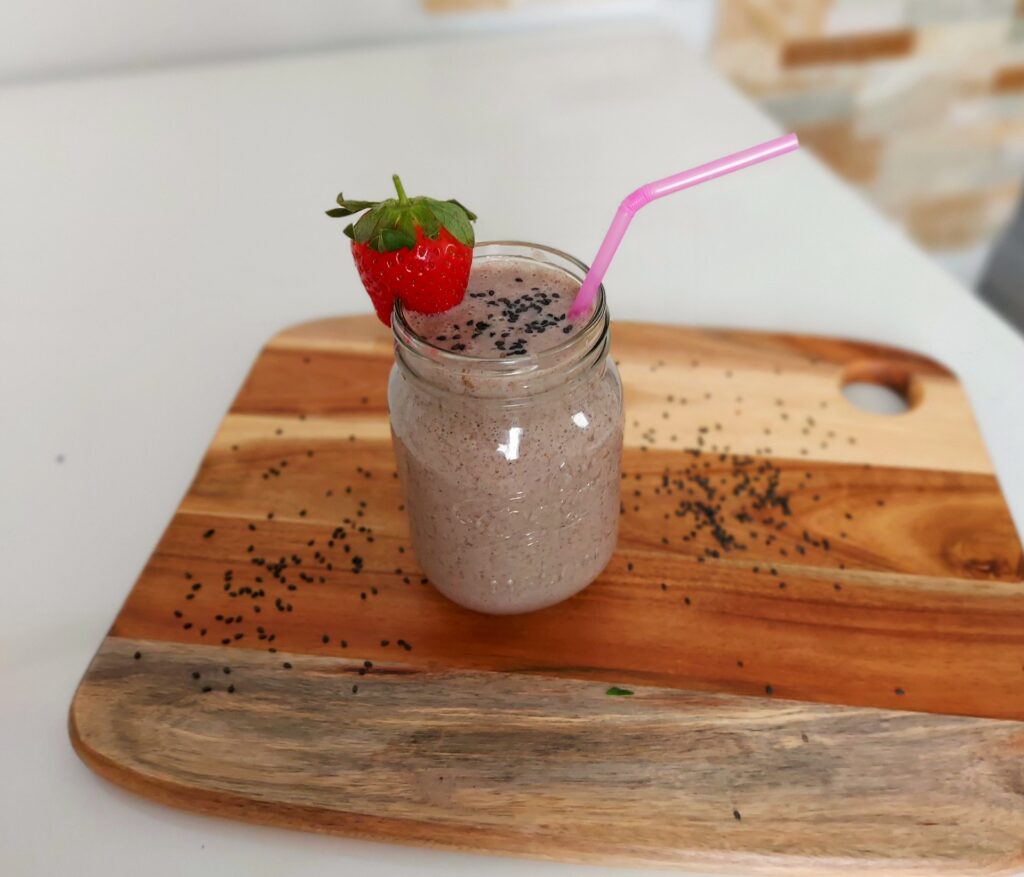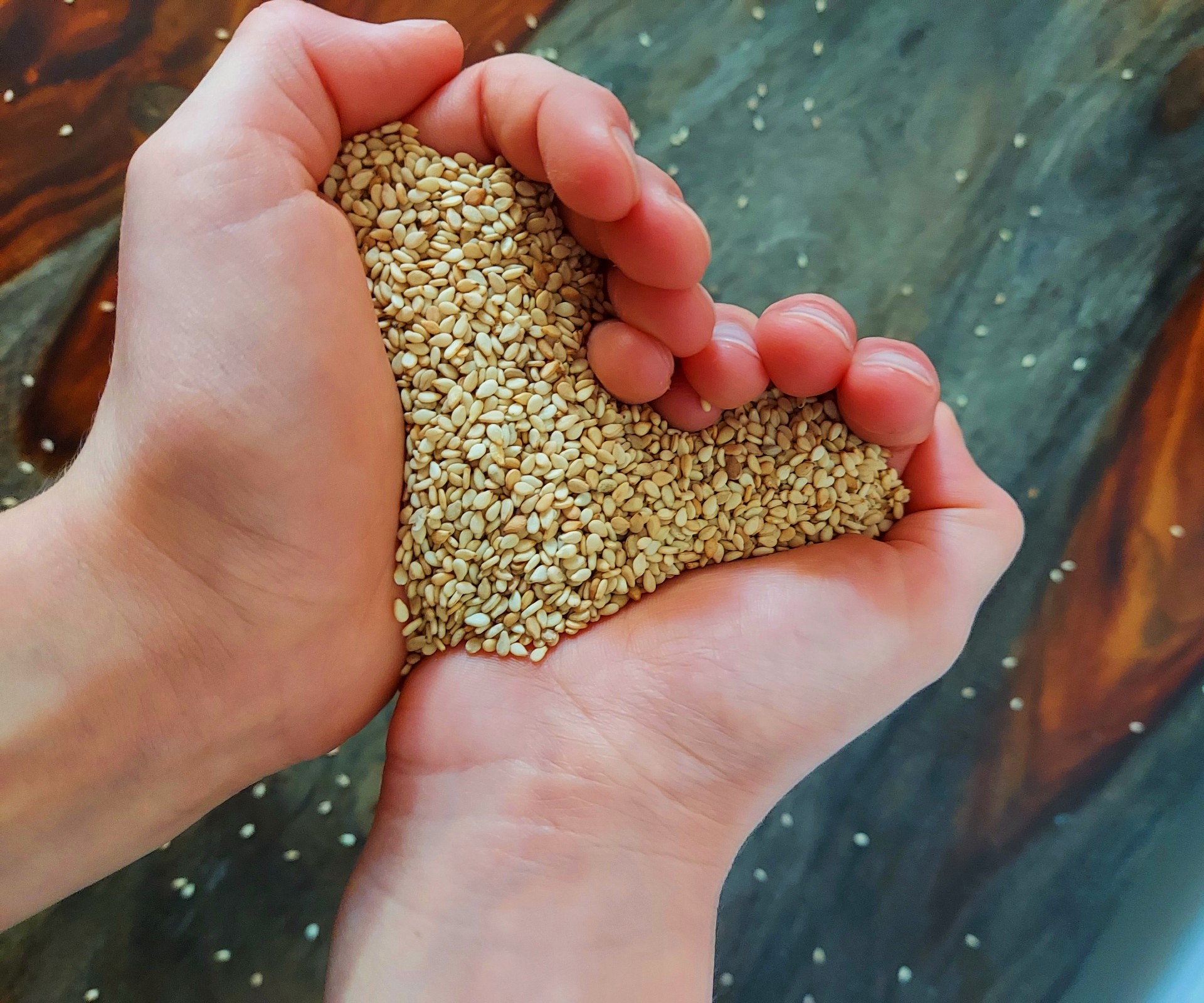As sleep and nutrition remain in a close relationship, either working in harmony or against each other1, my interest in food promoting high-quality sleep continues to grow. Thus, the latest reading led me to studies presenting the benefits of sesame seeds–a nutrient-dense ingredient that might not be just one of the healthiest foods in the world but also a great condiment to go for to get a restful sleep we have been dreaming about!
Introducing sesame seeds
Sesame (Sesamum indicum L.) is one of the world’s most important and oldest crops known to man and cultivated for its edible seeds, oil, and flavoursome value2. Several regions of the globe plant sesame seeds and its world production in 2018 was 6 million tonnes, with Sudan, Myanmar, and India as the largest producers. Different varieties of sesame spread throughout the world, and depending on the cultivar, seeds occur in many colours from white, yellow, red, brown, grey to black.
Sesame seeds are a common ingredient in cuisines all over the world for their delightful aroma, nutty flavour, and rich source of nutrients. Their nutritional properties vary slightly across different types and the area of cultivation. However, overall, sesame seeds are abundant in protein, vitamins (B, A, E), dietary fibre, phosphorous, iron, magnesium, calcium, manganese, copper, and zinc3. Hence, this great mixture of nutrients translates into many wellbeing advantages, including supporting our precious sleep.
How sesame seeds benefit sleep
Tryptophan
In 100 g of sesame seeds, there is about 0.37 g of tryptophan. Tryptophan is an essential amino acid that the human body doesn’t produce itself; thus, it must be gained from food. Then, when tryptophan is provided to our bodies, it aids the production of the neurotransmitter called serotonin that helps us feel soothed and relaxed. This, doubled with the tryptophan that supports the manufacture of the sleep-inducing hormone melatonin, will be an excellent combination on the way to improving our sleep.
Calcium
Further, about 36 g of sesame seeds (1/4 cup) provides 351 mg of calcium which covers about 35% of the recommended daily value for this mineral4. Calcium, which is involved in melatonin production, helps us to drift off to sleep easier. According to Balch (2006)5, lack of this mineral alongside magnesium deficit can be responsible for waking up after a few hours and inability to return to sleep.
Magnesium
Yet again, in 36 g of sesame seeds, we can find about 125 mg magnesium that provides us 30% of the optimal daily amount of this nutrient. Women are particularly disposed to low levels of this mineral, a deficiency of which is often linked to insomnia. In addition, a low amount of magnesium intensifies stress and causes muscle cramps. In contrast, by increasing the intake of magnesium, we can support our state of relaxation, reduce the occurrence of migraines and cramping during menstruation. Then again this supports calcium transportation which subsequently improves our sleep performance, including increased sleep times, fewer early morning awakenings, and better sleep efficiency.
Research
The effects of black sesame seeds consumption on sleep quality amongst the elderly who experienced insomnia were recently investigated in Chiang Mai University in Thailand6. The researchers randomly divided participants into 3 groups, including two intervention groups and one control cohort. Subjects in the control group maintained their usual diet while participants in experimental groups, consumed either 30 g per day of crushed roasted black sesame or 20 g per day of powdered roasted black sesame for 12 weeks in addition to their usual food and drink intake. The results showed that sleep quality assessed by The Pittsburgh Sleep Quality Index (PSQI) increased significantly amongst participants consuming powdered roasted black sesame compared to the control group. Further, the scientists did not observe any side effects related to the consumption of black sesame seeds. In the light of these findings, the study was concluded that in the future, black sesame seeds could be consumed as a safe supplement to a treatment aimed at improving the quality of sleep by people struggling in this area.
How to enjoy sesame seeds in your diet
To enhance the taste and nutrient accessibility from sesame seeds, you can roast them in the oven at 180℃ for a few minutes. Remember to stir the seeds frequently. Take them out from the oven when they reach a light brown colour. You can also roast sesame seeds on a dry frying pan over low heat for about 3-5 minutes. Once cooled down, blend this little treasure in a grinder and add to salads, stews, porridge or sandwiches. Sesame seeds will also be a perfect addition to bread dough or smoothies.
Smoothies… I love them because they are so versatile, easy to make, and guarantee a meal bursting in nutrients. With this in mind, I am pleased to recommend to you one of my favourite smoothies that promote a good night’s sleep.
Bedtime smoothie (two portions)

Ingredients:
1 cup unsweetened oat milk
1 banana
5-6 strawberries
1 kiwi
1 tablespoon almond butter
2 tablespoons roasted, grounded black sesame seeds
Preparation
- Toast the sesame seeds in the oven or on the frying pan (as instructed above). Once the toasted sesame seeds have cooled down, blend in a blender or spice grinder.
- Place all the ingredients (including ground sesame seed) in a blender and blend on high gear until smooth.
- Pour into glasses and enjoy.
Sweet dreams!
References
1. St-Onge, M.P., Mikic, A., & Pietrolungo, C.E. (2016). Effects of Diet on Sleep Quality. Advances in nutrition, 7(5), 938-949. https://doi.org/10.3945/an.116.012336
2. Kanu, P.J. (2011). Biochemical Analysis of Black and White Sesame Seeds from China. American Journal of Biochemistry and Molecular Biology, 1, 145-157. https://doi.org/10.3923/ajbmb.2011.145.157
3. Pathak, N., Rai, A. K., Kumari, R., & Bhat, K. V. (2014). Value addition in sesame: A perspective on bioactive components for enhancing utility and profitability. Pharmacognosy reviews, 8(16), 147–155. https://doi.org/10.4103/0973-7847.134249
4. http://www.whfoods.com/genpage.php?tname=foodspice&dbid=84
5. Balch, P.A., (2006). Prescription for nutritional healing (4th ed.). Penguin.
6. Saisum, S., Hudthagosol, C., & Srisorrachatr, S. (2020). Effect of Black Sesame Seeds (Sesamum indicum L.) Consumption on Sleep Quality among Thai Elderly. Food and Applied Bioscience Journal, 8(1), 68-75. https://li01.tci-thaijo.org/index.php/fabjournal/article/view/240016





Hi! I love your blog! Thanks for the tips!
Hi Jack! Thank you for taking the time to read the article. I appreciate it.
Warmest regards